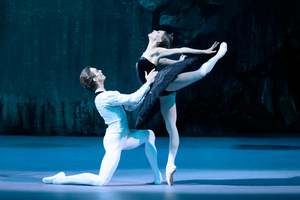Review: SWAN LAKE, Bolshoi Ballet in Cinema

![]() As part of the 243rd season of the iconic ballet company, several productions by the Bolshoi Ballet are again being broadcast on cinema screens across sixty countries. As one of seven of these ballets, Swan Lake is surely the most iconic, having debuted at the Bolshoi theatre in 1877. Tchaikovsky's incredibly evocative score wasn't enough to secure initial success, but for many people today, Swan Lake is ballet.
As part of the 243rd season of the iconic ballet company, several productions by the Bolshoi Ballet are again being broadcast on cinema screens across sixty countries. As one of seven of these ballets, Swan Lake is surely the most iconic, having debuted at the Bolshoi theatre in 1877. Tchaikovsky's incredibly evocative score wasn't enough to secure initial success, but for many people today, Swan Lake is ballet.
The Bolshoi Ballet have been dancing this Yuri Grigorovich version of Swan Lake for an incredible fifty years. Grigorovich pitches this version as an examination of Prince Siegfried's mental state, reducing the usual four acts to two, each split into Prince Siegfried's real and fantasy worlds. The real world is a medieval court where the prince searches for his bride. The fantasy one is where he explores the dark recesses of his own imagination while Odette, Odile and The Evil Genius play out their stories. It does tend to feel disjointed and isn't helped by the Russian custom of stopping for extended bows and applause after every interlude.
The production is also missing that somewhat vital of elements; a lake. Simon Virsaladze's design of swirling greys in a rather plain backdrop suggests ethereal, watery mist, but the actual lake and the forest surrounding it are conspicuous in their absence. Without the lake, it is hard to connect the presence of swans.
Under Soviet rule, the ballet had to have a happy ending, which seems almost impossible to British audiences, who prefer to sob into their hankies when the lovers throw themselves into the lake. Grigorovich's version has no happy ending, but lacks drama as Odette seems to die behind a gauze curtain and the Prince simply sinks dejectedly to the stage. It is too muted, lacks resolution and does no justice to the swell of passionate emotion in the score.
However, the dancing is so mesmerising that it is understandable why the company have stuck with this version of the ballet for so long, despite its flaws.
Olga Smirnova was hypnotic as Odette-Odile when the company performed in London last summer and retains the role for this screening. She is the archetypal Russian ballet dancer, with such precision and poise it is breathtaking to watch. Her Odette is coy and graceful, with such exquisite shaping of her hands and fingers that it is almost possible to imagine them as feathers and the extension of her neck is incredibly beautiful.
Her Odile is a consummate wicked seductress, sinuous and more flirtatious in her facial expressions and movements. Gone are the doe-eyed glances at Siegfried; she now flashes with dark purpose.
Jacopo Tossi dances the role of Prince Siegfried. Since joining the Bolshoi in 2017 he has become a leading soloist, and the extended role in this ballet is highly demanding. He has a beautiful elegance in his lines and an incredibly straight posture in his long limbs. Tossi is an elegant and considerate partner to Smirnova and their pas de deux at the end of Act I is beautifully balanced.
As The Evil Genius (usually known as Von Rothbart to British audiences), Egor Gerashchenko takes a while to warm up, seeming a little clumsy, with less-than-sharp execution of his moves in the first act. Act II is a distinct improvement and he shows clearer stage presence, conjuring Siegfried's destiny.
Alexei Putintsev is an excellent Fool; excelling in the court scenes at the beginning of Act II; he has great bounce and stride, with effortless energy in his jumps and pirouettes. Eleanora Sevenard is also a delightful Spanish Bride, with great musicality in her steps.
Despite the genius of Smirnova, the real star of this production is the corps de ballet; the musicality of their steps, along with incredible symmetry of movement is simply stunning. This is classical Russian ballet at its very best.
Conducted by Pavel Sorokin, the Bolshoi Theatre Orchestra give a brisk performance that is sublime in places, with a beautiful solo from the lead violinist during the BLACK SWAN pas de deux.
Filmed by Isabelle Julien, the camera positions and shots are extremely well-considered. There is a large amount of excellent wide shots; from stage-height to a very high shot looking down, (presumably fixed to a box) allowing a brilliant view of the whole stage and a new appreciation of the incredible symmetry and thoughtful placing of the dancers. All the cameras are allowed to gently zoom in and out of the action, which shows the energy and technique brilliantly.
Ultimately, the Bolshoi's Swan Lake is an imperfect production mainly because the ending is so unsatisfying. That said, it's amazing what you can forgive with such sublime dancing.
The Bolshoi Ballet's Swan Lake is encoring in cinemas on 29 March and 19 April
Photo Credit: Natalia Voronova
Reader Reviews

Videos

